Lessons from Out In 10 Days A Book Written and Published by Will Seippel Founder/CEO WorthPoint Inc.
Danna: Thanks, everybody, for joining us. We’re excited. I don’t know if you can see the screen, but I have the book that Will Seippel has written called Out In 10 Days.
In today’s presentation he’s going to share a lot of tips with us about his strategy, and we have Wayne Jordan with us who is the Chief Editor at WorthPoint. He’s here today, and he’s going to ask Will the questions to guide us along. Meanwhile, I will be happy to bring up any screens that we may need or pictures, and we’ll take it from there. Let’s get started.
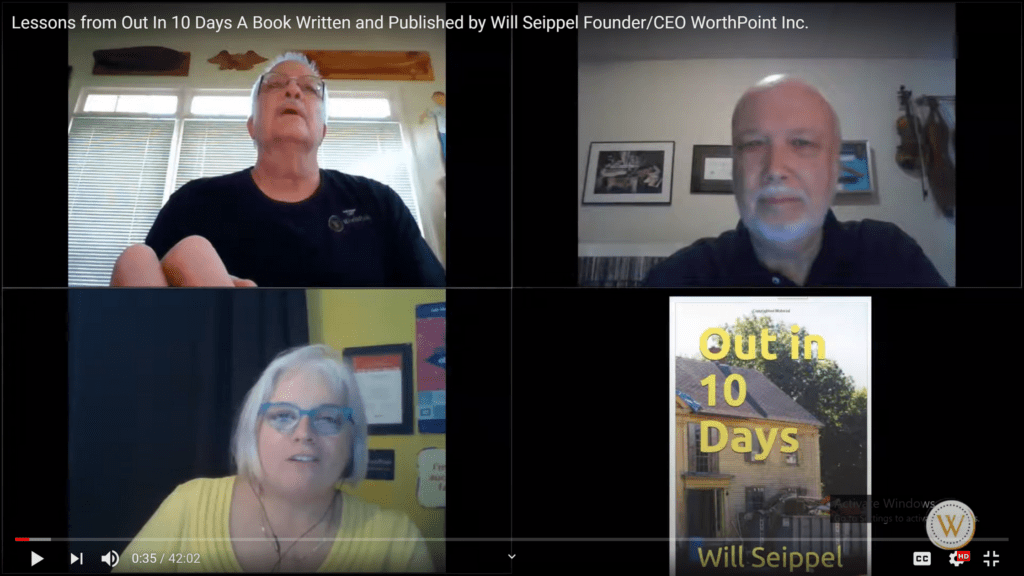
Wayne: Thanks, Danna. I think my role today is actually going to be an instigator. If Will’s ready to go, I’ll throw the first question at you. Just to pull up some background, so that our listeners know your situation and what we’re going to be talking about today, you recently, meaning last January, sold and moved out, was it a 5,200 square foot house in Kennebunk, Maine?
Will: Yeah.
Wayne: I’m curious, how did you get to Kennebunk? You didn’t grow up there did you?
Will: No.
Wayne: What made you buy a house in Kennebunk?
Will: I lived in New Hampshire for a long time, Wayne. I always liked the beach area up there, and my parents lived up there. So, I happened to get more involved in the Kennebunk community as my parents were there. I had taken a Make-a-Wish group under my arm when a friend’s son had died of leukemia. One day I happened to be up there for Make-a-Wish Foundation work.
This house I had looked at forever had long been derelict and came on the market that day. It’s like it was meant to be. That’s how I got there, and that’s how I ended up with the house– I ended up buying the house with the contents.
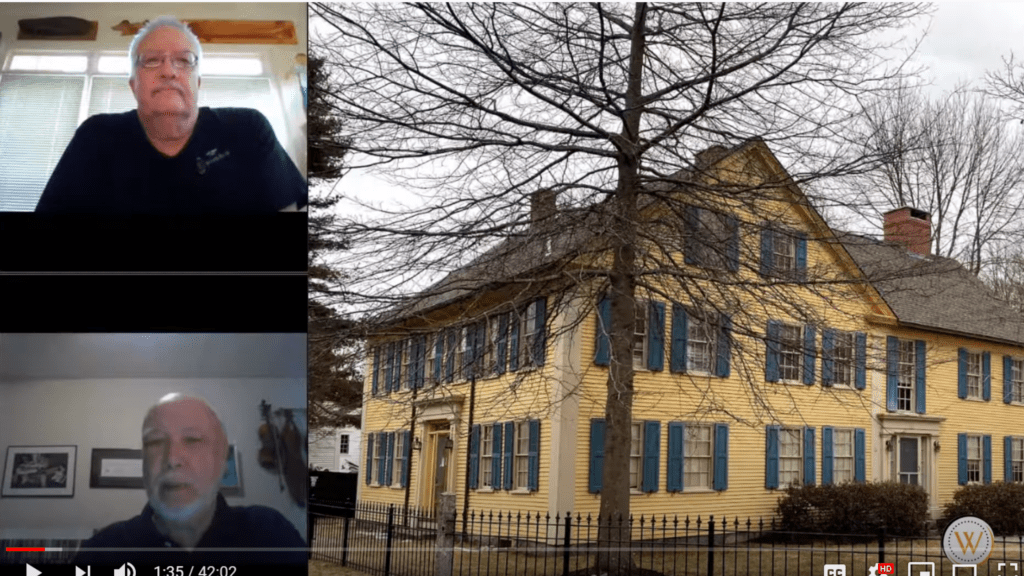
Wayne: The house wasn’t the only property you bought there. Did you buy more properties the same day, or did they come over time?
Will: No. They kind of fell in my lap like stray kittens. There was a wharf at the end that was derelict, and we ended up buying that. We have five properties that we restored, then the house next door. It was really funny–the house next door that we ended up buying, the owners were absentee owners, they were up in Vermont.
They had rented it out, and it itself was a derelict house and a bunch of crazy people lived behind me that were drunk or high on something all the time. They would play mumblety-peg out in the backyard that was full of bamboo and have bonfires in a 55-gallon drum while they were drinking, and literally go to work and come back and roll out of the cars with a bottle in their hand and fall on the ground. It was not the nicest neighborhood.
Wayne: Sounds like it.
Will: It reminded me that there was a small engine repair down on the end of the wharf that I got that business with it. The guy drove to work everyday that worked down there, and he was blind.
Wayne: Drove and he was blind?
Will: He drove, and he was blind. He knew his way by rote, and he had a stick that he would have on the gravel down by the wharf so that if his tires hit the stick he knew he had come to the end, and if he drove further he’d drive his car into the river. He was really pretty clever.
Wayne: Interesting neighborhood. You said several times, you’ve mentioned the word derelict. What did you have to do to these properties and the house specifically? Tell us about the house. What kind of shape was it in?
Will: My house, that big yellow thing you see, we called it the yellow pig, because it needed all kinds of upkeep. It was allegedly haunted, and there were vines that grew over the roof, literally. You could hardly see the house in the summertime.
A piano had fallen through the basement floor. We needed you, since you knew about pianos. I wish I had you then. It was a mess. There was one electrical outlet in the whole house. There were holes in the roof. It was quite a disaster. You see with the flag out on the back? We literally lifted that about four feet up in the air on jacks and built a foundation under it.
Wayne: When you bought the house, was your wife with you?
Will: No.
Wayne: No. Okay. What was her impression when she first went into the house? Had she seen it before?
Will: She was pissed. My wife was pissed.
Wayne: Yeah. But she stayed, obviously. You lived there for how long?
Will: I lived there about 20 years. We never ended up really moving there, but I lived up there about 20 years.
Wayne: Did you raise your family there?

Will: No. The kids would come up in the summertime. It was a place I used to get away. I managed the business. I’d stay there seeing my parents. I considered it a home, but it was largely a place for me to get away and see my parents and the kids to come up.
Wayne: How many years did you work on rehabilitating the house?
Will: It only took about a year, maybe two years. I don’t know. It’s kind of like the pain of childbirth, you forget. We had a pretty much full-time crew rehabbing it. We spent way more on rehabbing the house than we did on the property initially.
It was kind of fun, because all the contents came with the house, but a bad guy, I hate to say, kind of befriended the hermit that lived in there, that had lived in there all his life for about 90 years, and he stole everything of really significant value out of there.
He ultimately lost his auctioneer’s license over it. It was something he did on an ongoing basis, and this time he got caught, and all the states stepped in. The guy that lived there (and I think it was his sister that haunted the place) got put in a nursing home. But, he was so used to living out in the elements and not with people, he immediately caught measles and died in the nursing home.
Wayne: Really?
Will: Yeah.
Wayne: Well, it was a good thing that the auctioneer lost his license.
Will: Yeah. He lived in a 1950’s car out in the shed, but a lot of history in the place. I think I was only the fourth or fifth owner in 250+ years.
Wayne: I read in your book that you had a nickname around town. They called you the Gravedigger. Tell us about that.
Will: I think it was a term of affection. As I said in the book, it was funny, when you went to help me write the book, you envisioned this bucolic time up there on the ocean, because the ocean comes up in the back of the house in an inlet– this bucolic time with my kids.
I laughed and said, “Wayne, living in Maine in Kennebunk is a cross between the sitcom Green Acres and living with Stephen King as a neighbor.” The funny thing in Green Acres, and this was like Green Acres, everybody’s insane but Eddy Arnold. By definition, he’s sane, because the standard is insane.
One day, the town just decided, when I was fixing a retaining wall that we had fixed before, that there was a graveyard in my side yard, and I got hit with a $50,000 fine for digging in a graveyard in a coastal protected zone. It kind of amazed me, because I’d fixed the wall before.
Deciding there was a graveyard there, which there wasn’t, and digging in it, the people in town started calling me the Gravedigger. It was kind of funny. I allegedly was out digging in graves, so I thought it was funny. We ultimately got the fine forgiven. I mentioned to you that the town got lost in the great Zumba scandal at Kennebunkport, and they forgot about me digging in the graveyard.
Wayne: I’ve read that there is a very strong fitness culture in Kennebunk, and one of the favorite pastimes was Zumba. Can you tell the listeners what Zumba is and why it was so popular in Kennebunk?
Will: Zumba is a really hot Latino exercise. I think that’s where the word Zumba comes from. I don’t know exactly what it means. You shake a lot while you’re Zumba dancing. Kennebunk had a Zumba dance studio that was down next to a pizza parlor in downtown Kennebunk, not Kennebunkport, but Kennebunk, which is adjacent, and technically I lived in Kennebunk, not Kennebunkport.
So, the Zumba dance and practice was really popular in Kennebunk. It was so well known that, heaven forbid, one of my daughters was going to go learn how to do the Zumba down at the Zumba clinic.
One day, there was a complaint from the pizza parlor, from a person eating pizza there one night, that all kinds of noise was coming out of the Zumba clinic that was literally closed that night. The police investigated and found out it had been run as a prostitution ring for about 10 years. So, I said, wow. The Zumba teacher was pretty hot, so I’m not surprised.
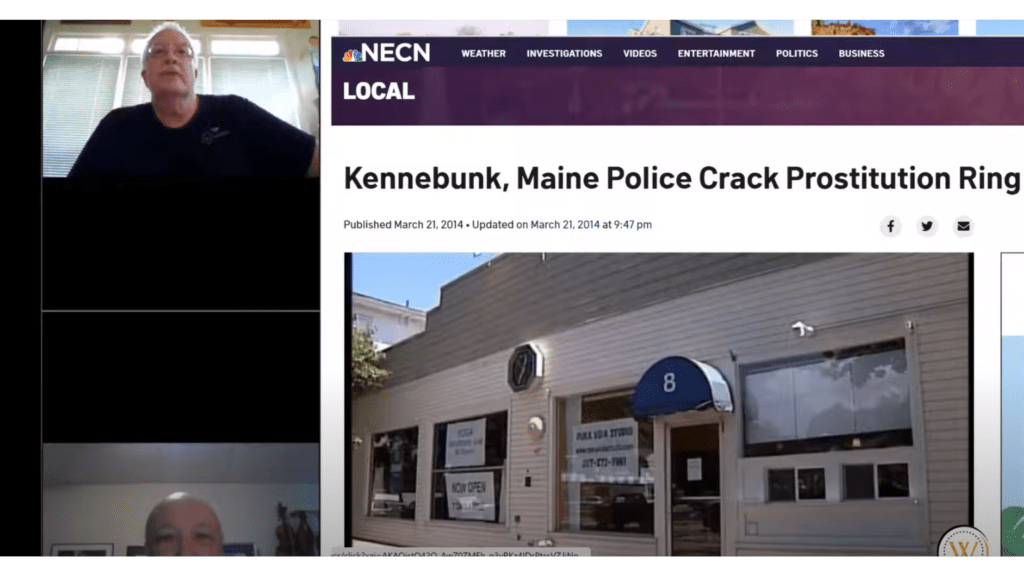
Wayne: She was exercising all the time.
Will: She was.
Wayne: Sweating and …
Will: It turned out, Wayne, she had thousands of customers, and she kept really good financial records and video records of the sessions, the workout sessions. It was on national news. We had national news coverage up there. The reporters all showed up, and it was the longest thing.
They were trying to figure out how do you handle so many people in the court system, and so they had to go to a limited list and make a list of the thousands of customers, Jills and Johns, and start at the top of the list. I think anybody that was not living in the town was on the top of the list that they would prosecute first, but they made their way down the list.
It was always a question who’s on the list and who was going to be on the list. I got all kinds of questions on my social media about was I on the list, because people knew that I spent a lot of my time up there.
So, heaven forbid, I wasn’t on the list, but it had to be embarrassing for the poor people to go to court, because they had videos to prove your involvement, you Zumba-ed. They would, I guess, play them in court, so the juries must have had fun.
They made their way down the list, and before they got too far down into the town, fathers that were presumably on the list, they settled with Miss Wright, that was her name, Alexis Wright, and the rest of the list got torn up. There was a settlement, and everybody moved on. That was our excitement.
That was the Stephen King part. There were just all kinds of mysteries and skeletons in every closet. Living in Maine for 20 years was quite interesting, and a little bit different than living in New Hampshire. I told you, speaking of Stephen King, my brother looked a lot like him and would hang out in the nightclubs and restaurants in Kennebunkport and sign people’s books and get free drinks.
Wayne: Clever. I read another story in your book that I found amusing. Let me just throw this question at you. Have you ever been arrested?
Will: Only in Kennebunkport. It was funny, because I also learned living in Maine the second most item that comes up in court, behind divorce, is property boundaries and property disputes, because the Maine boundaries go back into the 1700s.
Maine was actually part of Massachusetts. I don’t know if you know that. It didn’t become its own state until 1820. The boundaries in Maine are all screwed up. They run off of rocks and stones and trees that get moved over time or die.
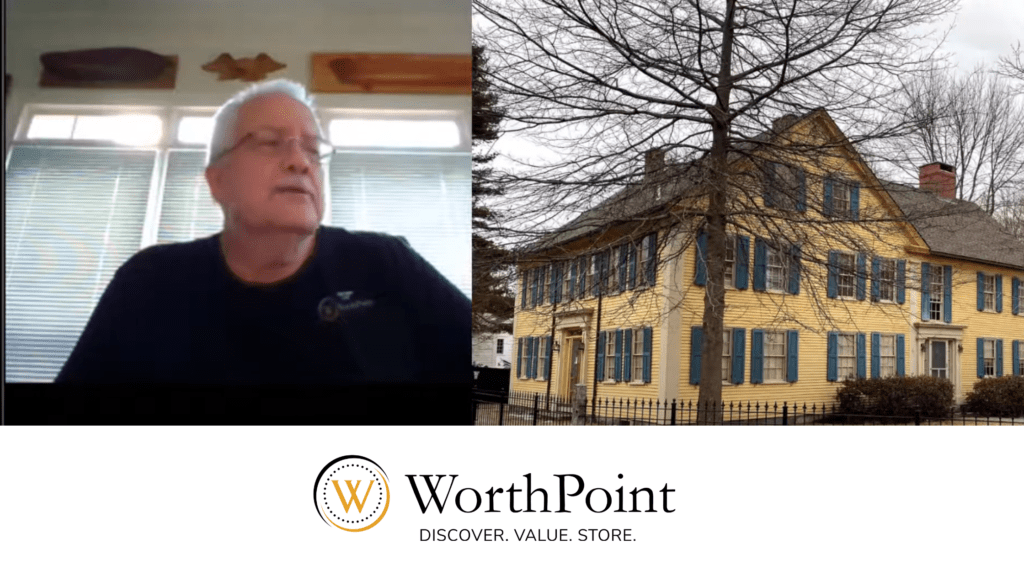
My neighbor and I owned a private road that came with my wharf, and she claimed she owned the road. So, while I didn’t get arrested for Zumba, because I wasn’t on the list, although we pretended I was. I had pictures taken with the Atlanta police handcuffing me, so I put out that I was on the list, but I wasn’t.
She claimed that the road was her property and had me arrested. I was handcuffed for being on her property. So, we had to send her something that got her senses legally that she would move her fence off of my property and drop all her claims, or we would press charges against her. So, yeah, in Kennebunkport. Only in Maine would something like that happen.
Wayne: You didn’t have to go to the big house.
Will: No. They didn’t take me down to the big house. Heaven forbid, that’s probably a formidable place in Kennebunk. They had to keep all the Zumba people somewhere.
Wayne: Why would you want to leave a nice place like that?
Will: I finally had enough. I sold my wharf about 2002. I gave up my dream of wanting to be part of that. I joked with you and said it’s like Who Stole My Cheese? Everybody’s focused on these little things. While I love the place and love so many things about Maine, it’s just that Stephen King and Green Acres effect that made me say it just wasn’t worth the time and the trouble.
One morning, I got a call. It was a cool house, cool piece of property, cool location, and the caller said, “Do you want to sell your house?” We’ve all probably gotten those calls from time to time. I said, “I’d love to sell my house. Are you interested in buying my house?” I thought it was a prank call, but it turned out to be a great offer with no realtor fees, and that’s where I was gone in 10 days. All cash.
Wayne: Really?
Will: Yeah. Like this is too good to be true. Maybe the town wanted me out. Who the heck knows?
Wayne: So, you sold the house, and had to be out of there and the house broom clean in 30 days, right? 30 days to closing?
Will: Once they closed, I had to be out of there. They probably gave me 30 days or something like that. It was the dead of winter. I just said, this is too good to be true. I really don’t want to be up here for another season, which turned out to be fortuitous, because Covid came up, and there is no season in Maine this year.
Everything’s closed. You can imagine as weird as the state is that everything was closed with quarantine. I said, this is too good to be true, and I’m not going to wait for something to go wrong. I laugh. I have a saying, I made like a hockey player and got the puck out in 10 days.
Wayne: You’d been in that house for 20 years. The house is full of antiques and collectibles and things that had been there for who knows how long. That must have been a pretty daunting task to look around at all that and realize that you wanted to get out of there. How did you approach and plan for getting out of there?

Will: I’m thinking now, Wayne, that would have been a good alternative story, like Rocky and Bullwinkle, for which title do you want to take. We could have had a book called 10 Days to Get the F#$% Out.
Wayne: Might have run into a problem with Amazon on that one, I think.
Will: It’s like everything else, Wayne, you got to come up with a plan. For me, fortunately, I know a lot about antiques, and I know a lot about our trade. I just said, I’m going to take all this and do the best I can, and you may get some broken eggs making this omelet, but I’m going to be out. I was really worried about the weather.
We had no heat in the house. That’s turned off for the winter, and it’s forced hot water, so putting it back on is a big ordeal the buyers didn’t want me to do.
Making that plan, I think one of the things that’s really important is having a crew you can depend on. That is what we ended up doing, bringing a handful of people up to help me, having good movers. What I learned last time is I tried to move with a national company, and the packing ended up being a disaster and so much got broken, even the leg off a highboy.
This time I chose to do it myself, and this whole operation that we had up there was do-it-yourself. That’s what we ended up doing. We started planning ahead, and I ordered heating equipment from Costco, so we had portable heating equipment.
That was one of the first things we did. We made sure that was there. We made sure that we drop shipped packing supplies, although as we relate to in the book, we had to order more. I missed and underestimated what we needed. But the heating equipment we ordered from Costco, and shipping supplies were drop shipped to the porch.
I also thought it was important to have a local person on the ground, and so I hired somebody locally and paid them to facilitate things that we needed to have there, or when we need something done. He arranged to get the dumpster. He arranged for a local porter to help us. Getting somebody that knew the local ropes was just really important for us.
The other thing we did ahead of time was we got a base of operations. Since there’s no heat in the house, there’s obviously no plumbing. So, bathroom breaks, especially when you’re using coffee to keep yourself awake, were really critical. We got a base of operations. We rented a condo with four bedrooms that was within easy walking distance of where we were. All this really led to facilitate getting a team up there.
Lastly, one of the most important things to do in Maine, because liquor is very expensive, we made sure when we flew into Boston to drive up to Maine, which saves a lot of money on tickets, that we stopped at the New Hampshire liquor store on the way.
Wayne: A guy has priorities, right?
Will: Absolutely. We all were well-stocked in wine.
Wayne: Good. How many people did you have helping you move?
Will: I think there were about five of us that I flew up from the WorthPoint team. We all bought our tickets 30 days in advance, assuming this would close, so we got cheap tickets. We flew up and stayed in the condo. There were about five of us. Then we had the local help. We had a full-time porter, as I mentioned, and a local townsperson. They made sure after we left that the place was properly cleaned, and the dumpster got picked up.
Wayne: So, here you are. It’s the dead of winter in Maine. You’ve got no heat or plumbing in the house. You’ve got a team of five people, and you have boxes and packing supplies that were delivered to you. How did you go about organizing that, so that you could get everything done? Were people having trouble getting together, working together, focusing? Tell me how you organized all of that.
Will: I think coming up was overwhelming to people. Most everybody had never been to Maine, which was kind of interesting. Although it’s beautiful, you want to make sure that the sightseeing, the drinking in the sights, don’t overcome the monster job to be done. It’s cold.
We were lucky, and this was not, to the time I was up there, a snowy winter. I had expected a lot of snow on the ground, and there wasn’t hardly any on the ground. The days actually got above freezing, but it was cold. It was cold in the house.
The house sits on a granite foundation with a basement, so it picks up the temperature of the ground, which was generally frozen, and radiates up through the house. We had to make sure that everybody stayed focused, and that we knew our jobs going in. We had some people, including myself, that were designated packers.
One of the things that I made sure is the moving company we had contracted with. I call it a moving company, but he’s basically a two-person transporting company. He moves antiques for a living. I think he lives in Connecticut. He’d just finished a run down to Florida. I had him show up the first night I was there for him to take in what had to be moved and how much we thought we were going to move.
We were pretty close, but he was a little under in guessing, so one of the emergency things is we had to get a second truck. His truck was 26 feet, and you don’t want anything bigger than that, because you start getting into heavier federal laws. He took a gather of what we were proposing to move.
I had already in my mind decided what I was going to keep and what I wanted to get rid of, and that’s a big thing. Given I’d gone through the death of a lot of family over the last 10 years or so, 10-20 years, I’ve learned that nothing is permanent, and anything is going to end up in memories anyway. We can talk about how to preserve those memories some day in the WorthPoint Vault.
I had a very clear picture in my mind of what I was going to get rid of and not try to keep. You can imagine a 5,000 square foot house with my stuff in there, let alone a lot of the prior family’s stuff I kept. There was a lot of things in there, and I had to be pretty draconian about what I kept and what I got rid of. So, I had my mind made up. That first night I was there, I had colored stickers that we put on everything that we could find. One color meant we keep. One color meant it goes. It made it much easier to then come in quickly later and move.
The mover just that night took an idea of what he needed, and I thought he was going to bring me all my boxes that I hadn’t ordered, and that was a misnomer. He brought boxes up a day later, but that still wasn’t enough. A lot of the boxes I wanted to be a heavier weight, which I think is really important for people to get double-sided boxes, which is a much heavier weight.
Keep in mind, in my case and a lot of people’s cases, you’re not just moving point to point. In my case, I planned to buy a place down in Florida and be down there soon, so a lot of what we moved from there we put in a warehouse. If you think a box is going to last a long time in a warehouse or double stacked with that type of weight, it ain’t going to happen unless it’s a double-sided box.
The last thing you want to move, and this is just a huge red flag to everyone, is you don’t want to hire one of these large moving companies and have your stuff put in storage. You want to put it in your own storage. I will promise you that things will break if they’re going to put it in storage.
People just don’t take care, and you can’t hold any one person accountable, because they’ll blame it on somebody else. I’ve tried that once, and I knew it, and I tried it once, and it was a disaster. I have my own public storage place over in Alpharetta, and everything’s happy there in a climate-controlled environment. I have two units, and I can double and triple stack boxes, because they’re double-sided.
Wayne: Good tip. You mentioned earlier that when you sorted through things and put stickers on that you marked the things that you were going to keep and the things that you were going to get rid of. By get rid of, you mean take to the dump or to Goodwill or sell? What do you mean when you say get rid of, and how did you go about doing that?
Will: That’s a really good question. We had a methodology for that. The second person that came to visit me the first night I was up there was a local auctioneer, and he had an auction house in Gloucester. I had originally contemplated selling my house in the summer and having an onsite auction. I think we would have had a homerun in the value, but I had to weigh that value versus I got a good buyer in the dead of winter. I had been planning to try to sell this house anyway, and when it came up I had a buyer it was in the dead of winter. Let me turn my phone off here. I thought I had done that.
I had to make a decision. How was I going to facilitate this in wintertime? So, I found an auctioneer that was connected with WorthPoint that I happened to know for a period of time. I arranged for him to come up the night that I was there, the first night, and we agreed what I was getting rid of would go to auction. He obviously tried to talk me into getting rid of some other things that I kept, but I wouldn’t budge. I’d already made up my mind. He took everything to auction that I wanted to get rid of.
Let me be clear. My goal, and everybody will probably say, you’re the CEO of WorthPoint, you can afford to fly all these people up there and do this and do that. No. My goal was what I was going to get rid of was going to cover all my moving costs. It would cover employee tickets. It would cover the cost of moving. It would cover all that. We did succeed on that goal.
For example, there were two old Mobil gas station signs that I had in the attic that went to a local gas station with a winged horse on it. We got a couple thousand bucks out of those. My goal was the best things I would send to auction.
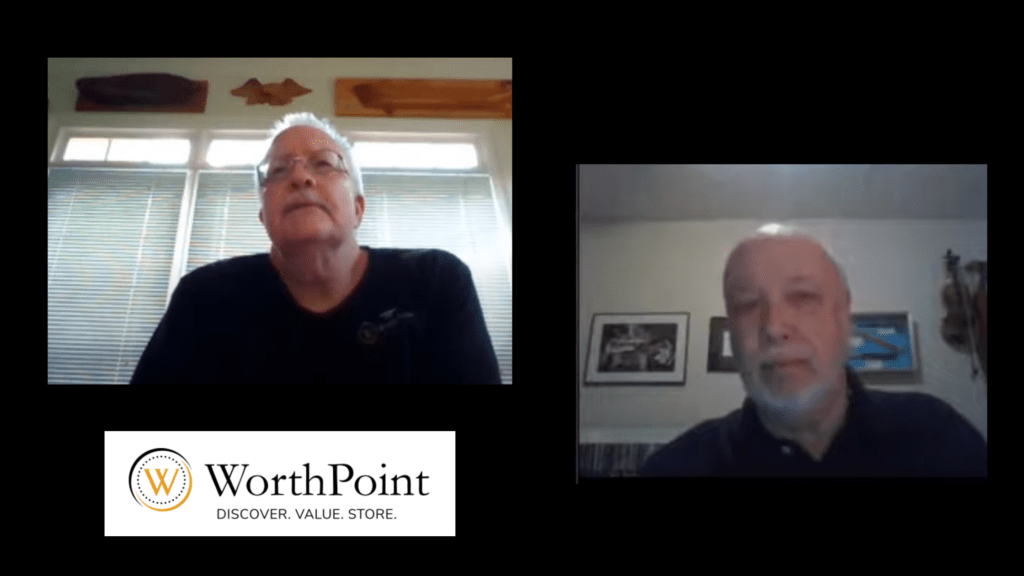
The next best things we would try to sell online, and so we used eBay and Facebook Marketplaces. We may have posted even on Craigslist. The rest of the things, which were still good things, we gave, for example, six thousand-dollar kayaks, apiece, to Habitat for Humanity that I couldn’t get a reasonable offer in the dead of winter in Maine, so I took them as tax deductions and decided to do some good. We gave them to Habitat for Humanity.
So, we had auction house. We had online. We had Habitat for Humanity, and we had a dumpster. Those were our classifications for getting rid of. Rarely did I change my mind as to what I wanted to do with something. There were eons of old stuff in the basement.
We found a windshield for, I think it was a Speedwagon car, REO Speedwagon, or a Flying Cloud REO. That I still have in storage here, because one day I’ll get that on eBay, and it will take a longer amount of time to sell, but it’s probably a thousand dollar, give or take, windshield. That was the point of having a good porter, that he knew good junk when he saw it. He alerted me.
The first things we did were the auction house and the mover, and the next thing we did, because there was a lot of stuff in the attic, this house had a big attic, what I was keeping up there I didn’t want anybody to get confused. So, starting Day 2, I started packing the attic myself, and we got about 40 large boxes out of there that we were keeping. We had already taken out what was going to the auctioneer, and then what we were taking to the dump I threw out the third-floor window. That was pretty funny.
Wayne: Did you throw it right into the dumpster?
Will: No. Wrong side of the house, but it really splattered really neatly. I don’t mean it was a neat splatter, but it was a fun splatter to watch when it hit the ground. It was a satisfying feeling.
Wayne: I can imagine.
Will: We cleaned that sucker out. I could have cried with the thought of having to go in there and do that. Both because of the emotions that you opened up, but also with the amount of work. I can tell you this was an intense process. We probably made some mistakes along the way and didn’t optimize everything perfectly, but I think we did a damn good job.

Wayne: You got it done, and you got it done in 10 days. This will be the last question I’ll throw at you, and then you can take questions from our listeners. If you had to do it all over again, knowing what you know now, what would you have done differently?
Will: I don’t know. I’m so happy with the outcome. I wish it was a perfect world and that we could save everything that we wanted to save, because there were a couple mistakes where things got sold for the wrong price. By the way, you’re going to have people that want to crash and come in. We had a tag sale too.
I forgot about that. It’s hard to believe we did all this in that short of time. I think all the online marketplaces were a good thing. I think keeping everybody organized and focused was the real challenge. I think that in hindsight I would have been clearer about some of the instructions going in, but I’m just real happy with how the outcome was.
You just can’t wring your hands over I could do everything perfect. I would equate the same, Wayne, to people selling on eBay, and I’m sure a lot of people will see this that are eBay sellers, and trying to do too much research for something. I think the fact that I’m infamous for sometimes having fingers in my photos for my listings, but I sell a lot. You just got to weigh the pros with the cons and be ready for it.
I wish that some things hadn’t gone out for a certain price or something, but in hindsight it all evened out pretty well. I’m just really happy with the outcome. I move on and just see things go.
Wayne: Congratulations on getting out in 10 days. I enjoyed your book. There’s a few stories that we didn’t get around to here that are definitely worth reading, so I encourage your listeners to get your book.
Will: Who would believe you could have such a Zumba goings on and all this stuff in this little bucolic Maine coastal town, you know? I think it was even eye opening for you. The ironic story at the end of this is, as you know and as we haven’t talked about here, most of this house got ripped down, which was a shame.
The buyer had a totally different idea as to what to do with the house. I suspect, although I don’t know how they’ll get it through zoning, but it’s small town Maine, that it will turn into something commercial like an inn or a restaurant or something. You have to be ready in life. Memories are just that, and memories go. The best thing you can do is try to document things and keep the memories and keep the memories with the item, but you just have to be willing to let go.
Wayne: Good advice. It’s been nice chatting with you. I’m going to zip my lip and turn it back over to Danna. Danna, it’s all yours.
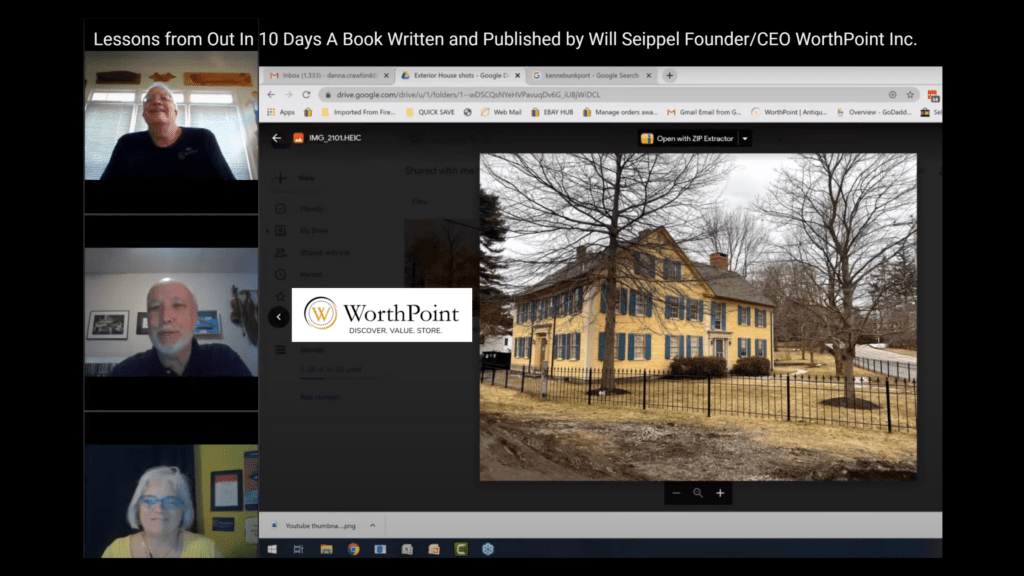
Danna: That was great. I think that it was an amazing adventure, and it was a lot to be proud of. I had the opportunity to be there firsthand, and Will just did an amazing job keeping us all in order and helping us stay focused on getting this job done. It was quite impressive. Everybody needs to read the book.
Will: We had a lot of fun and learned a lot. I learned a lot, which is cool.
Danna: Yes. Indeed. Okay, everybody. Thanks for joining me. Watch your inbox for the replay, and thank you, Will, and thank you, Wayne.
VIDEO REPLAY
Want to keep learning? Join the webinar list and receive invites to all future online webinars:
https://mailchi.mp/worthpoint/webinarlist
